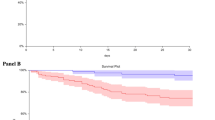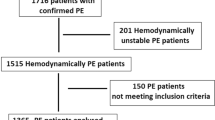Summary
Objective
Despite wide usage of digoxin for various diseases in cardiology practice, its benefit is controversial and moreover it had been associated with unfavorable outcomes in some previous studies. The aim of this present study was to demonstrate whether digoxin usage was related with worse outcomes or not in patients with acute pulmonary embolisms.
Methods
A total number of 1215 patients retrospectively enrolled for the study. Basic demographic features, pulmonary embolism severity index (PESI) scores, laboratory parameters and medications of patients who had been diagnosed with acute pulmonary embolism were recorded. Short (30 days) and long-term mortality were reported as the clinical outcomes.
Results
Total mortality was 15.4% in the study population and 78 of these subjects died within the first 30 days. The frequency of digoxin treatment was 8% and most of these patients were prior users. According to the binary logistic regression analyses the PESI score, right ventricle (RV) diastolic diameter, systolic pulmonary arterial pressure (sPAP), brain natriuretic peptide (BNP), troponin and digoxin therapy (odds ratio, OR: 2.82 95% confidence interval, CI: 1.39–8.31, P = 0.03) were found as independent predictors of short-term mortality. Beside these findings; sPAP, PESI score, RV diastolic diameter and digoxin therapy (hazard ratio, HR: 2.11 95%CI: 1.22–7.31, P = 0.03) were determined as independent predictors of long-term mortality in Cox regression analyses. In subgroup analysis, we determined significantly greater increase in short-term mortality with use of digoxin among patients who had chronic renal disease, among patients under thrombolytic therapy and under high dosage of digoxin therapy and among female patients.
Conclusion
Digoxin has been used extensively for decades in the treatment of heart failure and arrhythmias despite some controversies over its benefit. For the first time in the literature, we have demonstrated independent association of digoxin therapy with short-term and long-term mortality in patients with acute pulmonary embolism.



Similar content being viewed by others
References
Ziff OJ, Lane DA, Samra M, et al. Safety and efficacy of digoxin: systematic review and meta-analysis of observational and controlled trial data. BMJ. 2015;351:h4451.
Vamos M, Erath JW, Hohnloser SH. Digoxin-associated mortality: a systematic review and meta-analysis of the literature. Eur Heart J. 2015;36(28):1831–8.
Lopes RD, Rordorf R, De Ferrari GM, et al. Digoxin and mortality in patients with atrial fibrillation. J Am Coll Cardiol. 2018;71(10):1063–74.
Metawee M, Charnigo R, Morales G, et al. Digoxin and short term mortality after acute STEMI: results from the MAGIC trial. Int J Cardiol. 2016;218:176–80.
Chan KE, Lazarus JM, Hakim RM. Digoxin associates with mortality in ESRD. J Am Soc Nephrol. 2010;21(9):1550–9.
Allen LA, Fonarow GC, Simon DN, et al. Digoxin use and subsequent outcomes among patients in a contemporary atrial fibrillation cohort. J Am Coll Cardiol. 2015;65(25):2691–8.
Washam JB, Stevens SR, Lokhnygina Y, et al. Digoxin use in patients with atrial fibrillation and adverse cardiovascular outcomes: a retrospective analysis of the Rivaroxaban Once Daily Oral Direct Factor Xa Inhibition Compared with Vitamin K Antagonism for Prevention of Stroke and Embolism Trial in Atrial Fibrillation (ROCKET AF). Lancet. 2015;385(9985):2363–70.
Whitbeck MG, Charnigo RJ, Khairy P, et al. Increased mortality among patients taking digoxin—analysis from the AFFIRM study. Eur Heart J. 2013;34(20):1481–8.
Turakhia MP, Santangeli P, Winkelmayer WC, et al. Increased mortality associated with digoxin in contemporary patients with atrial fibrillation: findings from the TREAT-AF study. J Am Coll Cardiol. 2014;64(7):660–8.
Eisen A, Ruff CT, Braunwald E, et al. Digoxin use and subsequent clinical outcomes in patients with atrial fibrillation with or without heart failure in the ENGAGE AF-TIMI 48 trial. J Am Heart Assoc. 2017;6(7):e6035.
Heit JA. The epidemiology of venous thromboembolism in the community. Arterioscler Thromb Vasc Biol. 2008;28(3):370–2.
Oh JK, Seward JB, Tajik AJ. The echo manual. 3rd ed. Philadelphia: Lippincott Williams & Wilkins; 2009. pp. 401–15.
Konstantinides SV, Torbicki A, Skoro-Sajer N, et al. 2014 ESC guidelines on the diagnosis and management of acute pulmonary embolism: the task force for the diagnosis and management of acute pulmonary embolism of the European Society of Cardiology (ESC). Russ J Cardiol. 2015; https://doi.org/10.15829/1560-4071-2015-8-67-110.
The Digitalis Investigation Group. The effect of digoxin on mortality and morbidity in patients with heart failure. N Engl J Med. 1997;336(8):525–33.
Gheorghiade M, Braunwald E. Reconsidering the role for digoxin in the management of acute heart failure syndromes. JAMA. 2009;302(19):2146–7.
Rathore SS, Wang Y, Krumholz HM. Sex-based differences in the effect of digoxin for the treatment of heart failure. N Engl J Med. 2002;347(18):1403–11.
Hunt SA, Abraham WT, Chin MH, et al. 2009 focused update incorporated into the ACC/AHA 2005 guidelines for the diagnosis and management of heart failure in adults: a report of the American College of Cardiology Foundation/American Heart Association Task Force on Practice Guidelines developed. J Am Coll Cardiol. 2009;53(15):e1–e90.
Leor J, Goldbourt U, Rabinowitz B, et al. Digoxin and increased mortality among patients recovering from acute myocardial infarction: importance of digoxin dose. Cardiovasc Drugs Ther. 1995;9(5):723–9.
Alajaji W, Baydoun A, Al-Kindi SG, et al. Digoxin therapy for cor pulmonale: a systematic review. Int J Cardiol. 2016;223:320–4.
Rich S, Seidlitz M, Dodin E, et al. The short-term effects of digoxin in patients with right ventricular dysfunction from pulmonary hypertension. Chest. 1998;114(3):787–92.
Mina GS, Acharya M, Shepherd T, et al. Digoxin is associated with increased shock events and electrical storms in patients with implantable cardioverter defibrillators. J Cardiovasc Pharmacol Ther. 2018;23(2):142–8.
Virgadamo S, Charnigo R, Darrat Y, et al. Digoxin: a systematic review in atrial fibrillation, congestive heart failure and post myocardial infarction. World J Cardiol. 2015;7(11):808.
Furberg CD, Vittinghoff E, Davidson M, et al. Subgroup interactions in the heart and estrogen/progestin replacement study: lessons learned. Circulation. 2002;105(8):917–22.
Aebi S, Schnider TW, Los G, et al. A phase II/pharmacokinetic trial of high-dose progesterone in combination with paclitaxel. Cancer Chemother Pharmacol. 1999;44(3):259–65.
Author information
Authors and Affiliations
Corresponding author
Ethics declarations
Conflict of interest
M.B. Karataş, N.S. Yelgeç, Y. Çanga, A. Zengin, and A. Emre declare that they have no competing interests.
Additional information
Publisher’s Note
Springer Nature remains neutral with regard to jurisdictional claims in published maps and institutional affiliations.
Rights and permissions
About this article
Cite this article
Karataş, M.B., Yelgeç, N.S., Çanga, Y. et al. Association of digoxin therapy with case fatality rate in acute pulmonary embolism. Wien Klin Wochenschr 133, 1171–1178 (2021). https://doi.org/10.1007/s00508-020-01773-z
Received:
Accepted:
Published:
Issue Date:
DOI: https://doi.org/10.1007/s00508-020-01773-z




